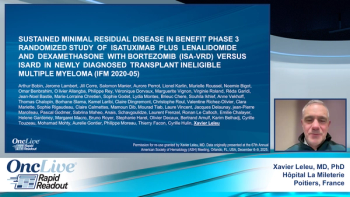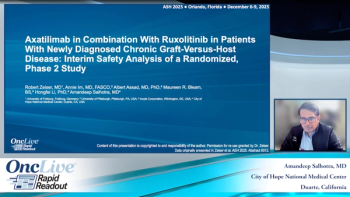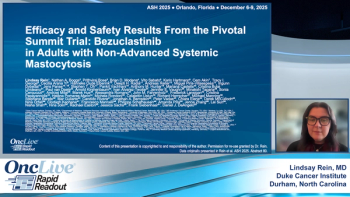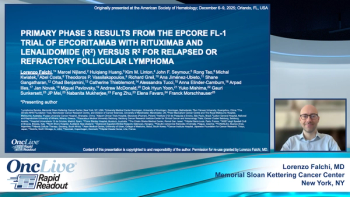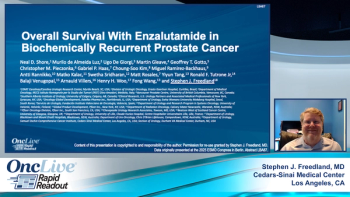
|Videos|December 8, 2022
Rate of Atrial Fibrillation in Patients With B-Cell Malignancies Who Undergo Treatment With Zanubrutinib
Author(s)Constantine S. Tam, MD, MBBS
Sponsored by BeiGene. Content developed independently by OncLive. Dr Tam reviews the risk of atrial fibrillation along with other cardiovascular events in patients who either receive ibrutinib or zanubrutinib for b-cell malignancies.
Background
- Treatment of B-cell malignancies has been improved by effective inhibitors of B-cell receptor signaling, such as the first-generation BTK inhibitor, ibrutinib
- Although ibrutinib has demonstrated efficacy, it has been associated with an increased risk of cardiovascular toxicities such as atrial fibrillation/flutter (Afib)2-5 and ventricular arrhythmias (VA)
- Zanubrutinib is an irreversible, potent, next-generation BTK inhibitor designed to maximize BTK occupancy and minimize off-target inhibition-related toxicities
- Zanubrutinib has been generally well tolerated, with an established efficacy reported in clinical trials in patients with B-cell malignancies
- Here, we report the occurrence of Afib and symptomatic idiopathic VA (IVA; defined as a VA occurring in structurally normal hearts in the absence of myocardial scarring and active infections) in the 2 head-to-head trials of zanubrutinib vs ibrutinib, ASPEN (NCT03053440) and ALPINE (NCT03734016), and a larger pooled analysis of zanubrutinib studies
Methods
- Safety data reported by investigators from clinical studies of zanubrutinib were pooled and descriptively analyzed
- Event rates and exposure-adjusted incidence rates (EAIR) of Afib and IVA with zanubrutinib vs ibrutinib were calculated in a post hoc analysis of the phase 3 clinical studies ASPEN(cohort 1) and ALPINEand in a pooled analysis of 10 clinical studies of zanubrutinib in patients with B-cell malignancies
- The primary analysis was to compare EAIR between ibrutinib and zanubrutinib, with P values of the comparison calculated based on asymptotic normal distribution
- Medical history of Afib and cardiovascular disorders (i.e. VA or HTN) was assessed at the time of enrollment and before treatment with zanubrutinib or ibrutinib using MedDRA v24.0
- Afib included atrial fibrillation and atrial flutter events; VA included any event in SMQs of ventricular tachyarrhythmias (narrow) and MedDRA HLT of ventricular arrhythmias and cardiac arrest; cases were adjudicated to include IVA
- Afib and VA events that occurred during treatment were graded by CTCAE (v5.0 in the LTE1 study and v4.03 in all other studies); symptomatic VAs were grade ≥2 VA events per CTCAE
Results
- In the pooled analyses, 1550 patients received zanubrutinib as monotherapy for the treatment of B-cell malignancies, with the largest subgroup being individuals with CLL/SLL (61%; 938/1550 patients)
- Median age was 67 years, with 61% of patients aged at least 65 years
- Most patients were men (66%), White (67%), and had an ECOG performance status of 0 or 1 (44.5% and 49.4%, respectively)
- Analysis of Atrial Fibrillation
- Despite the similar proportion of patients with a medical history of Afib in the zanubrutinib arm compared with the ibrutinib arm in ASPEN (cohort 1) or ALPINE, respectively, the rate of treatment-emergent Afib events was approximately 4-fold lower with zanubrutinib than ibrutinib
- In cohort 1 of ASPEN, the rate of Afib events was lower with zanubrutinib (5.9%; 6/101) than ibrutinib (22.4%; 22/98)
- In ALPINE, Afib rates during the study were lower with zanubrutinib (1.9%; 6/324) compared with ibrutinib (8.0%; 26/324)
- The EAIR of Afib was significantly lower with zanubrutinib than ibrutinib in both studies (P < 0.05); zanubrutinib Afib EAIR in the pooled analysis were comparable to those observed in ASPEN and ALPINE
- Despite the similar proportion of patients with a medical history of Afib in the zanubrutinib arm compared with the ibrutinib arm in ASPEN (cohort 1) or ALPINE, respectively, the rate of treatment-emergent Afib events was approximately 4-fold lower with zanubrutinib than ibrutinib
- Analysis of Ventricular Arrhythmias
- Symptomatic IVA was reported in 0.3% (5/1550) of patients treated with zanubrutinib vs 1.4% (6/422) with ibrutinib
- In the ALPINE study, 0.6% (2/324) vs 1.5% (5/324) of patients reported AEs of symptomatic IVA with zanubrutinib vs ibrutinib, respectively
- No events of symptomatic IVA were reported in the zanubrutinib arm of the ASPEN study; one event was observed in the ibrutinib arm
- The EAIR of symptomatic IVA was lower with zanubrutinib (0.43 per 100 person-years) vs ibrutinib (1.19 per 100 person-years) in the ALPINE study (P = 0.2270) and in the pooled analysis for zanubrutinib (0.14 per 100 person-years) vs ibrutinib (0.87 per 100 person-years; P = 0.0028) in the pooled analysis.
- Across the pooled populations, symptomatic IVA led to discontinuation in 0.06% (1/1550) of patients treated with zanubrutinib and 0.5% (2/422) of patients treated with ibrutinib
- No deaths due to symptomatic IVA occurred with zanubrutinib, and one death occurred with ibrutinib
- Symptomatic IVA was reported in 0.3% (5/1550) of patients treated with zanubrutinib vs 1.4% (6/422) with ibrutinib
Conclusions
- The EAIR of Afib in the ASPEN cohort 1 (P = 0.0010) and ALPINE (P = 0.0003) studies were significantly lower for zanubrutinib than ibrutinib, and consistent with the rates in the pooled analysis of patients with B-cell malignancies treated with zanubrutinib
- EAIR of symptomatic IVA was significantly lower with zanubrutinib than ibrutinib in the pooled populations (P = 0.0028) and numerically lower in the ALPINE study (P = 0.2270)
- The EAIR of symptomatic IVA with zanubrutinib in ALPINE was low (0.4 per 100 person-years), but the EAIR with ibrutinib was consistent with that of previous reports (1.2 per 100 person-years)
- The data from the 2 head-to-head studies comparing zanubrutinib with ibrutinib in patients with CLL or WM, as well as pooled data presented here, demonstrate that the rates of Afib and symptomatic IVA with zanubrutinib are overall low and occur less frequently compared with ibrutinib therapy.
- Our findings support the use of zanubrutinib as a treatment option for patients with B-cell malignancies.
Tam CS, Wallis N, Zhang M et al. Rate of Atrial Fibrillation in Patients With B-Cell Malignancies Who Undergo Treatment with Zanubrutinib Poster presented at: 2022 Lymphoma, Leukemia, Myeloma, October 18-21, 2022; Abstract 1324736.
Latest CME
Trending on OncLive
1
FDA Approval Tees Up T-DXd Plus Pertuzumab as a New SOC in HER2+ Breast Cancer
2
Iberdomide Plus Daratumumab/Dexamethasone Displays High Response Rates in NDMM
3
FDA Advises on Next Steps for Nogapendekin Alfa Inbakicept Plus BCG sBLA in BCG-Unresponsive Papillary NMIBC
4
NALIRIFOX and FOLFIRINOX Facilitate Personalized Treatment in Metastatic Pancreatic Cancer
5


